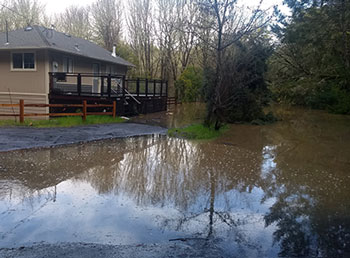Important Health Information about Floodwaters
Floodwaters contain many things that may harm health. We don’t know exactly what is in floodwater at any given point in time.
Floodwater can contain:

- Downed power lines
- Human and livestock waste
- Household, medical, and industrial hazardous waste (chemical, biological, and radiological)
- Coal ash waste that can contain carcinogenic compounds such as arsenic, chromium, and mercury
- Other contaminants that can lead to illness
- Physical objects such as lumber, vehicles, and debris
- Wild or stray animals such as rodents and snakes
Exposure to contaminated floodwater can cause:
- Wound infections
- Skin rash
- Gastrointestinal illness
- Tetanus
It is important to protect yourself from exposure to floodwater regardless of the source of contamination. The best way to protect yourself is to stay out of the water.
If you come in contact with floodwater:
- Wash the area with soap and clean water as soon as possible. If you don’t have soap or water, use alcohol-based wipes or sanitizer.
- Take care of wounds and seek medical attention if necessary.
More information from the Center for Disease Control and Prevention (CDC):
- Floodwater After a Disaster or Emergency
- Flood Waters or Standing Waters
- Infectious Disease After a Disaster
- Reentering your Flooded House
- Flood Clean Up: Protecting Indoor Air Quality (PDF)
When you First Re-enter your Home
Try to return to your home during the daytime so that you do not have to use any lights. Use battery-powered flashlights and lanterns, rather than candles, gas lanterns, or torches.
- If you have standing water in your home and can turn off the main power from a dry location, then go ahead and turn off the power, even if it delays cleaning. If you must enter standing water to access the main power switch, then call an electrician to turn it off. NEVER turn power on or off yourself or use an electric tool or appliance while standing in water.
- Have an electrician check the house’s electrical system before turning the power on again.
- If you smell gas or suspect a leak, turn off the main gas valve, open all windows, and your house immediately. Do not return until you are told it is safe to do so.
- If the house has been closed up for several days, enter briefly to open doors and windows to let the house air out for a while (at least 30 minutes) before you stay for any length of time.
- If your home has been flooded and has been closed up for several days, assume your home has mold.
- If your home has been flooded, it also may be contaminated with sewage. See Floodwater After a Disaster or Emergency.
Use Generators, Propane tanks and other Electrical equipment Safely
- If a generator is on line when electrical service is restored, it can become a major fire hazard. In addition, the improper connection of a generator to your home’s electrical circuits may endanger line workers helping to restore power in your area.
- All electrical equipment and appliances must be completely dry before returning them to service. Have a certified electrician check these items if there is any question. For more information, see Protect Yourself and Others From Electrical Hazards After a Disaster.
- Never use a generator, pressure washer, or any gasoline-powered engine inside your home, basement, or garage or less than 20 feet from any window, door, or vent. Visit Preventing Carbon Monoxide Poisoning After an Emergency for more information.
- Propane Safety Reminder: After the flood danger has passed and if you are able to reoccupy a home or business, it is critical to have a qualified service technician perform a complete inspection of your propane gas system. DO NOT use or operate appliances, or turn on the gas supply, until your system has been inspected by a qualified propane technician.
For more information go to https://www.cdc.gov/disasters/floods/after.html
